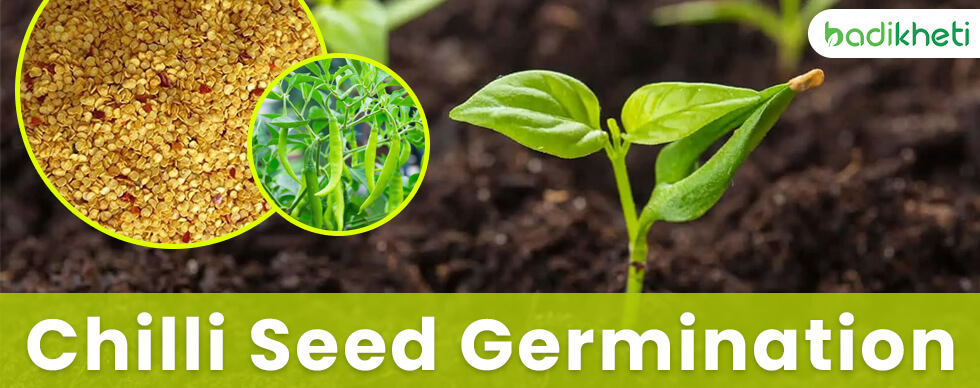
Chilli germination is the process through which chilli seeds sprout into a new plant, and it is essential for Indian farmers to learn about the process of germination as it has a direct impact on the quality and quantity of their chilli crops. Germination depends on more than one factor including temperature, irrigation, light, moisture, oxygen, and soil conditions.
Farmers in India can optimize those factors to make sure that their chilli seeds germinate at the best growth rate and produce healthy plants. Germination also regulates the timing of planting and harvesting, which are crucial factors to maximize crop yields and earning more profits.
Here are some of the potential germination tips for chilli seeds to Indian farmers. They can implement them to assure the best chilli crops.
Organic quality chilli seeds are seeds produced with no use of synthetic fertilizers, fungicides, pesticides, or herbicides. They are free from genetically modified organisms (GMOs) and irradiation; hence farmers are advised to buy quality chilli seeds online from an authentic platform like BadiKheti so that they can help in better germination in the field. Here are some of the top reasons to buy organic chilli seeds.
One factor related to germination is temperature because different types of seeds have different optimal temperature ranges for their best growth. Maintaining a perfect temperature helps in seed germination as it makes sure that the chilli seed gets the right amount of heat and energy so that metabolism is activated and dormancy is terminated.
If the temperature is very low or very high, chilli seeds do not germinate or might take longer to grow; hence, it is essential to provide the appropriate temperature for each seed variety to achieve successful germination.
Keeping the soil moist is important for chilli seed germination because it provides the water that the seeds need to activate their metabolism and start growing. Moist soil also helps to maintain a suitable temperature and oxygen level for the seeds. If the soil is too dry, the seeds will not germinate. If the soil is too wet, the chilli seeds may rot or suffocate. Therefore, it is advisable to water the soil lightly and regularly until the seeds sprout.
Irrigation in farming is the process of supplying water to seeds, crops, and plants; thus, it is essential for seed germination because it is the first stage of plant growth. Seed germination needs a certain amount of moisture and temperature to trigger certain enzymes and hormones responsible for the development. As stated earlier, if the soil is too dry or too wet, the germination of seeds becomes unclear and uncertain. Therefore, maintaining perfect irrigation helps in growing chillies from seeds by providing the optimal conditions for the seeds to sprout and grow.
Overall, by following these germination tips for chilli seeds, Indian farmers can ensure that their chilli crop will produce the best quality product and hence earn profits.
Introduction Chilli fondly known as "Mirchi" in Hindi holds great cultural and historical significance in India. It is not merely a culinary delight but an integral part of our traditions with significant links to agriculture and daily life. India takes great pride in being one of the leading producers and consumers of chillies globally, with various regions contributing to this spicy farming. This article aims to analyze the primary states involved in chilli cultivation within India, exploring their unique functions within the flourishing chilli industry....
Onions, also known as Pyaaz, or Kanda are the heart of India and are a lucrative cash crop for farmers here. If you’re looking to maximize onion seed growth and yields, there are certain farming practices that you have to consider. So, proper agricultural practices are critical to maximizing onion output and quality. For the best product, you must have quality onion seeds and proper agriculture equipment in place which you can buy from an online agriculture marketplace like BadiKheti. In this blog, we will...
Spices constitute an essential element of Indian gastronomy, imparting richness, and piquancy to an array of recipes. Among them, a distinct position is held by chili peppers, which however face consistent threats from various diseases that can cause severe damage to crops. Disease-resistant chili seeds have lately emerged as a revolutionary alternative to safeguard chilli farming in India. This write-up explores the prospective benefits of these types of chilli seeds and their significant impact on the future of Indian spice agriculture. The predicament of diseases...